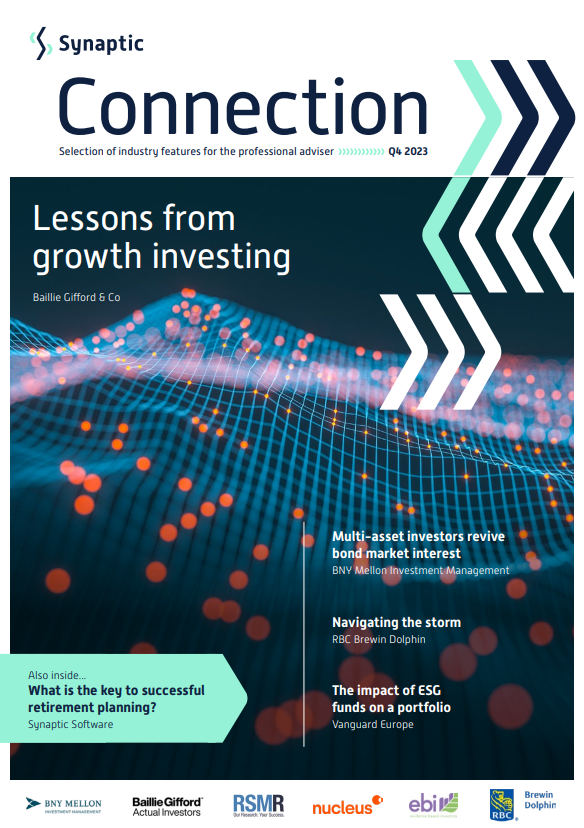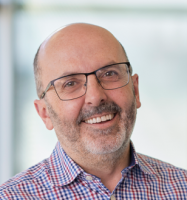In this edition...
- Lessons from growth investing Mark Urquhart, Partner Baillie - Gifford & Co
- I know pensions, but I wouldn’t tackle retirement income planning without a financial adviser Andrew Tully, Technical Services Director - Nucleus
- Multi-asset investors revive bond market interest Paul Flood, Head of Mixed Assets Investment - Newton Investment Management, part of BNY Mellon Investment Management
- Navigating the storm with Voyager Funds Antony Champion, Head of Intermediaries - RBC Brewin Dolphin
- What's the impact of ESG funds on a portfolio? Andreas Zingg, Head of Multi-Asset Solutions - Vanguard Europe
- Unprecedented climatic changes set new records Jonathan Griffiths, CFA Investment Product Manager - ebi
- Global market update Graham O’Neill, Senior Investment Consultant - RSMR
- Retirement income that flies in the face of market uncertainty Yannis Katsis, Business Development Director - Just Group
- What is the key to successful retirement planning? Good research, due diligence and above all, flexibility. Eric Armstrong, Client Director - Synaptic
- Hours to minutes ,
- The first rule of financial planning: insure the breadwinner ,
 Baillie Gifford partner Mark Urquhart shares lessons from a 27-year career that’s involved investing in Microsoft, Hermès and Netflix.
Baillie Gifford partner Mark Urquhart shares lessons from a 27-year career that’s involved investing in Microsoft, Hermès and Netflix.
When I needed a job after university, I walked to the careers department and hunted through lists of businesses in large ringbinder folders. I never imagined that 27 years later, I’d be investing in cloud computing, microchips and space rockets. There has been a huge shift in growth investing during my career, but I’ve learned more in the last five years than the previous twenty. Why?
Back then, a good growth company used to provide stable compounding growth of about 10-15 per cent a year - Lloyds Bank, BP or Vodafone. Over five years, it could double market value. But companies emerged in the new century with an ability to grow exponentially into very large markets.
I saw a new type of company growing consistently 25, 30, even 35 per cent. Over five years they could go up five-fold. That’s a quantum of difference and a whole new way of looking at the opportunity. The internet, connectivity and having a supercomputer in your pocket changed everything.
Starting at Baillie Gifford in 1995, we shared one computer at the end of the desk, looked at with suspicion. I was the trainee who might understand this new machine and the term ‘software’. In fact, Microsoft was the easiest investment case I’ve ever written.
Every computer sold was installed with Microsoft. It had 90% market share, huge operating margins and a visionary founder, Bill Gates. I recommended we buy, and our head of US equities approved the trade.
That experience was informative: I realised you could find companies which grow quickly, then double and double again. It’s a mindset I’ve tried to keep throughout my career.
In the 1990s and early 2000s, electric cars looked more like glorified golf buggies. Then Tesla entered the market, but there were still sceptics because the cars didn’t go far. Even if they were successful, surely the big guys like VW, Ford and BMW would cotton on and eat their lunch?
The market underestimated Elon Musk - just another rich maverick with an idea. But here was an entrepreneur able to take risks, drive through and deliver. Tesla makes cool looking cars with long ranges that people want to drive. Operationally they’ve scaled magnificently.
It took a brave individual to put all his own money at risk. Musk had made millions from selling PayPal and could have been sipping cocktails on a yacht instead. And yet he’s driven to keep doing it again with more companies, like SpaceX. There is something about people like that which is special but we shouldn’t expect them to be perfect humans.
"I realised you could find companies which grow quickly, then double and double again. It’s a mindset I’ve tried to keep throughout my career."
Volatility and crises
I have seen at least ten crises in a 27-year career. The market is always throwing things at you. I’ve learnt that you can’t control share prices - all you can do is focus on a company’s operational progress.
During the Financial Crisis, Apple’s share price halved from $200 to $100. Why? The iphone had been launched in 2007 and the company was firing on all cylinders, completely transforming the mobiles market. This made no sense. The stock market was totally disconnected from the fundamental progress of the business. That was a real lesson.
And sometimes macro invades the micro – when inflation, cost of living, or interest rates impact the business models of companies.
Take the recent pandemic, which will be studied in decades to come. Free trade, international movement, global economies – all halted.
A company like Peloton was growing nicely, in five or six countries. Then the gyms shut and people were desperate to exercise at home. Peloton scaled up fast to meet demand. But when society reopened, supply issues emerged. And people went back to the gym. It’s a shame because it could have scaled gradually, repeating the initial success in more countries.
Netflix was another ‘stay at home’ darling. Afterwards it had a big fall in the share price but is now back to growth. It has the strongest balance sheet in the industry by a mile and is developing different revenue streams. Investors like companies that are adaptable - Netflix was willing to change its business model when circumstances changed.
Drawing on all these experiences, I’ve been pondering the future of growth investing. Firms marrying technology with healthcare could do very well in the future. Take Dexcom, which produces a glucose monitor. It’s a tiny sensor inserted in the abdomen which tells diabetics whether their glucose range is high or low, every five minutes. This monitor saves lives.
The idea of getting data from the body to a phone seems like science fiction but we’re on the cusp of a huge explosion thanks to faster and cheaper genetic sequencing. The holy grail will be tackling cancer - a disease of genetic mutation. Bringing down the cost of healthcare, forming individual treatments and prevention - all feel within our grasp.
There will be entrepreneurs we don’t know of yet, solving some of the world’s biggest problems: clean energy, access to healthcare, better infrastructure, connected communities. Even after 27 years, I have great purpose to find them.
Find out more by visiting:
Important Information:
As with any investment, capital is at risk. This communication was produced and approved in August 2023 and has not been updated subsequently. It represents views held at the time of writing and may not reflect current thinking.
All information is sourced from Baillie Gifford & Co and is current unless otherwise stated.
This article does not constitute, and is not subject to the protections afforded to, independent research. Baillie Gifford and its staff may have dealt in the investments concerned. The views expressed are not statements of fact and should not be considered as advice or a recommendation to buy, sell or hold a particular investment. Baillie Gifford & Co and Baillie Gifford & Co Limited are authorised and regulated by the Financial Conduct Authority (FCA)
Sign up for updates
Keep up to speed with everything you need to know each quarter, by email or post.


